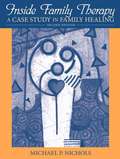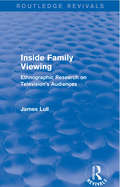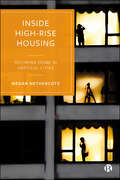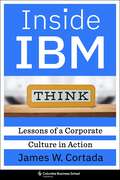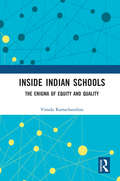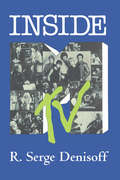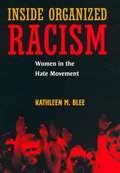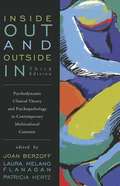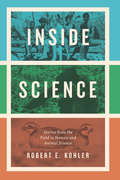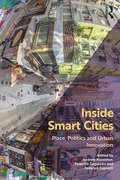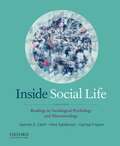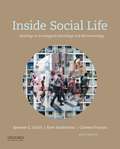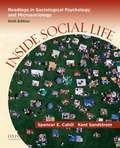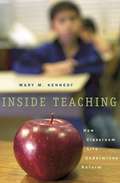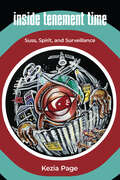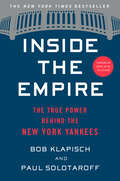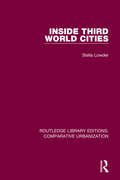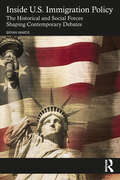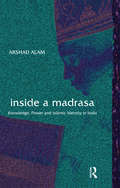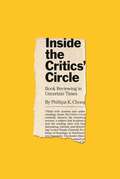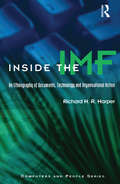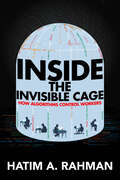- Table View
- List View
Inside Family Therapy (Second Edition): A Case Study In Family Healing
by Michael P. NicholsFollow a family therapist's narrative diary as he documents the process of working with the Salazars, as they explore each stage of their relationship-from courtship through the departure of the children from the home.This unique casebook provides an in-depth, personal account from the counselor's perspective, while also looking at the personal viewpoints of family members. Each major stage of the family life is presented in a separate chapter and the book includes discussions of the effects of gender, ethnicity, and sexual orientation on individuals and families. What Reviewers Are Saying: "Strengths include presentation of therapy scenarios; focus on one family going through the therapy to demonstrate the stages of therapy and the stages of family life; real life experiences of the Salazar family members (students get inducted into this and usually 'read ahead' of what is assigned, something not normally done!).""William Quinn, Clemson University" "The Inside Family Therapy book is perfect. What is so very impressive about the content and the writing style is how Mike Nichols weaves and threads ways of thinking as he sits with this family, along with specific skills he utilizes in his work with them. It allows students to see and experience what is going on within Nichols and how that is played out in what he says and does with the family. This is not an easy thing to do with the written word (except in novels) but he does it so very well. It also leads to much greater self awareness on the part of the students. "Robert Jackson, University of Iowa"
Inside Family Viewing: Ethnographic Research on Television's Audiences (Routledge Revivals)
by James LullFirst published in 1990, this title presents a rich account of how television intersects with family life in American and other world cultures. From an analysis of the political and cultural significance of China’s most important television series to detailed descriptions of how families in the United States interpret and use television at home, James Lull’s ethnographic work marks an important stage in the study of the role of the mass media in contemporary culture. This title will be of interest not only to those in media and communications, but also to those in the broader fields of cultural anthropology and sociology.
Inside High-Rise Housing: Securing Home in Vertical Cities
by Megan NethercoteEPDF and EPUB available Open Access under CC-BY-NC-ND licence. Condominium and comparable legal architectures make vertical urban growth possible, but do we really understand the social implications of restructuring city land ownership in this way? Geographer and architect Megan Nethercote enters the condo tower to explore the hidden social and territorial dynamics of private vertical communities. Informed by residents’ accounts of Australian high-rise living, this book shows how legal and physical architectures fuse in ways that jeopardize residents’ experience of home and stigmatize renters. As cities sprawl skywards and private renting expands, this compelling geographic analysis of property identifies high-rise development’s overlooked hand in social segregation and urban fragmentation, and raises bold questions about the condominium’s prospects.
Inside IBM: Lessons of a Corporate Culture in Action
by James W. CortadaIBM was the world’s leading provider of information technologies for much of the twentieth century. What made it so successful for such a long time, and what lessons can this iconic corporation teach present-day enterprises?James W. Cortada—a business historian who worked at IBM for many years—pinpoints the crucial role of IBM’s corporate culture. He provides an inside look at how this culture emerged and evolved over the course of nearly a century, bringing together the perspectives of employees, executives, and customers around the world. Through a series of case studies, Inside IBM explores the practices that built and reinforced organizational culture, including training of managers, employee benefits, company rituals, and the role of humor. It also considers the importance of material culture, such as coffee mugs and lapel pins.Cortada argues that IBM’s corporate culture aligned with its business imperatives for most of its history, allowing it to operate with a variety of stakeholders in mind and not simply prioritize stockholders. He identifies key lessons that managers can learn from IBM’s experience and apply in their own organizations today. This engaging and deeply researched book holds many insights for business historians, executives and managers concerned with stakeholder relations, professionals interested in corporate culture, and IBMers.
Inside Indian Schools: The Enigma of Equity and Quality
by Vimala RamachandranAfter 70 years after independence, the tragic reality of Indian schools is that who we are, where we live, how much we earn and our gender influences the kind of education we will get. In this collection of essays the author explores the contours of a school system that is facing a crisis of legitimacy. While India aspires to march towards a knowledge driven society and economy, millions of young people are left behind. Those who can afford march out of government schools only to realize that the private schools are no better. The schools they attend leaves them with little knowledge or skill, a very low self-esteem and a bleak future. This book argues that the struggle for equality in education, is ultimately a struggle for quality – both being two sides of the same coin. Please note: Taylor & Francis does not sell or distribute the Hardback in India, Pakistan, Nepal, Bhutan, Bangladesh and Sri Lanka.
Inside Intuition
by Eugene Sadler-SmithWhat isgut feeling and how can it be harnessed? To what extent should business decisions be informed byinstincts which may seem irrational or impossible to quantify? Inside Intuition examines how the latest developments in social psychology and cognitive psychology, as well as exciting new insights from evolutionary psychology and cognitive n
Inside MTV
by R. Serge DenisoffMTV is the third major breakthrough in music broadcasting, and the first since the late 1960s. ""Top Forty"" radio was initiated in the 1950s, and along with ""free form"" or ""progressive"" rock molded rock music exposure for nearly twenty years. Many observers credit MTV with resurrecting the music industry from the throes of the Great Depression of 1979. Few would dispute its impact on contemporary film, fashion, and radio.Inside MTV examines the world of cablecasting, the evolution of WASEC, MTV, VH-1, and some of their competitors. The strategies, personalities, promotions, and the contents that placed MTV on the road to its dominant position are described. The many controversies surrounding the channel are thoroughly detailed, and a good deal of the misinformation on the subject is corrected.It is a mere five years since MTV began as the third of four Warner-Amex Satellite Entertainment Company (WASEC) channels, created by two of America's largest conglomerates. Since then, it has become a major force. Before MTV was conceived the relationship between television and rock music was weak, at best. As the new partnership .developed, a story of genius, luck, and discrimination began to unfold, and a corporate innovation of major proportions and psychodemographic success emerged.MTV is now the most profitable 24-hour cable outlet beamed from a satellite. It reaches 30.8 million households. How all this happened is chronicled in this major new book from a leading authority on the American music business.
Inside Organized Racism: Women in the Hate Movement
by Kathleen M. BleeKathleen M. Blee's disturbing and provocative look at the hidden world of organized racism focuses on women, the newest recruiting targets of racist groups and crucial to their campaign for racial supremacy. Through personal interviews with women active in the Ku Klux Klan, neo-Nazi groups, Christian Identity sects, and white power skinhead gangs across the United States, Blee dispels many misconceptions of organized racism. Women are seldom pushed into the racist movement by any compelling interest, belief, or need, she finds. Most are educated. Only the rare woman grew up poor. Most were not raised in abusive families. Most women did not follow men into the world of organized racism. "Inside Organized Racism" offers a fascinating examination of the submerged social relations and the variety of racist identities that lie behind the apparent homogeneity of the movement. Following up her highly praised study of the women in the 1920s Ku Klux Klan, Blee discovers that many of today's racist women combine dangerous racist and anti-Semitic agendas with otherwise mainstream lives. Few of the women she interviews had strong racist or anti-Semitic views before becoming associated with racist groups. Rather, they learned a virulent hatred of racial minorities and anti-Semitic conspiratorial beliefs by being in racist groups. The only national sample of a broad spectrum of racist activists and the only major work on women racists, this well written and important book also sheds light on how gender relationships shape participation in the movement as a whole.
Inside Out and Outside In: Psychodynamic Clinical Theory and Psychopathology in Contemporary Multicultural Contexts (3rd edition)
by Joan Berzoff Laura Melano Flanagan Patricia HertzOver the past decade, Inside Out and Outside In has become a very important book among mental health practitioners in a variety of disciplines that deal with individuals in their complex social environments. Revised and updated throughout, the third edition builds on this foundation and adds a new chapter on cognitive behavioral theory and practice and a new chapter on relational and inter subjective theories to more fully meet the needs of both students and practitioners today. The third edition of Inside Out and Outside In maintains the book's respectful tone and empathetic voice while making many new additions. The chapter on affective disorders now includes bipolar disorders. Two other chapters update content on psychodynamic theory and race and gender. This edition also offers new research on schizophrenia and personality disorders. Other key updates include linking trauma theory with attachment, as well as attending to client systems, including couples, throughout the book. This new edition further deepens our understanding of the bio-psycho-social contexts in which clinical theory and practice occur, particularly in multicultural settings. It offers ways to clearly understand theories and clinical disorders in their biological and social contexts and provides key updates on new developments in the bio psychosocial domain.
Inside Science: Stories from the Field in Human and Animal Science
by Robert E. KohlerContext and situation always matter in both human and animal lives. Unique insights can be gleaned from conducting scientific studies from within human communities and animal habitats. Inside Science is a novel treatment of this distinctive mode of fieldwork. Robert E. Kohler illuminates these resident practices through close analyses of classic studies: of Trobriand Islanders, Chicago hobos, corner boys in Boston’s North End, Jane Goodall’s chimpanzees of the Gombe Stream Reserve, and more. Intensive firsthand observation; a preference for generalizing from observed particulars, rather than from universal principles; and an ultimate framing of their results in narrative form characterize these inside stories from the field. Resident observing takes place across a range of sciences, from anthropology and sociology to primatology, wildlife ecology, and beyond. What makes it special, Kohler argues, is the direct access it affords scientists to the contexts in which their subjects live and act. These scientists understand their subjects not by keeping their distance but by living among them and engaging with them in ways large and small. This approach also demonstrates how science and everyday life—often assumed to be different and separate ways of knowing—are in fact overlapping aspects of the human experience. This story-driven exploration is perfect for historians, sociologists, and philosophers who want to know how scientists go about making robust knowledge of nature and society.
Inside Smart Cities: Place, Politics and Urban Innovation
by Federico Caprotti Andrew Karvonen Federico CugurulloThe era of the smart city has arrived. Only a decade ago, the promise of optimising urban services through the widespread application of information and communication technologies was largely a techno-utopian fantasy. Today, smart urbanisation is occurring via urban projects, policies and visions in hundreds of cities around the globe. Inside Smart Cities provides real-world evidence on how local authorities, small and medium enterprises, corporations, utility providers and civil society groups are creating smart cities at the neighbourhood, city and regional scales. Twenty three empirically detailed case studies from the Global North and South – ranging from Cape Town, Stockholm and Abu Dhabi to Philadelphia, Hong Kong and Santiago – illustrate the multiple and diverse incarnations of smart urbanism. The contributors draw on ideas from urban studies, geography, urban planning, science and technology studies and innovation studies to go beyond the rhetoric of technological innovation and reveal the political, social and physical implications of digitalising the built environment. Collectively, the practices of smart urbanism raise fundamental questions about the sustainability, liveability and resilience of cities in the future. The findings are relevant to academics, students, practitioners and urban stakeholders who are questioning how urban innovation relates to politics and place.
Inside Social Life: Readings In Sociological Psychology And Microsociology
by Spencer E. Cahill Kent Sandstrom Carissa FroyumNow in its seventh edition, this best-selling reader provides an introduction to the sociological study of social psychology, interpersonal interaction, embodiment, emotion, selfhood, inequality, and the politics of everyday realities. Inside Social Life: Readings in Sociological Psychology and Microsociology presents forty-two selections that include both classic and contemporary theoretical work and empirical studies. Detailed introductions to each part and article identify and explain central issues, key concepts, and relationships among topics.
Inside Social Life: Readings in Sociological Psychology and Microsociology
by Spencer Cahill Kent Sandstrom Carissa Froyum<P>Now in its eighth edition, this best-selling reader provides an introduction to the sociological study of social psychology, interpersonal interaction, embodiment, emotion, selfhood, inequality, and the politics of everyday realities. <P>Inside Social Life: Readings in Sociological Psychology and Microsociology presents thirty-nine selections that include both classic and contemporary theoretical work and empirical studies. Detailed introductions to each part and article identify and explain central issues, key concepts, and relationships among topics.
Inside Social Life: Readings in Sociological Psychology and Microsociology
by Spencer E. Cahill Kent L. SandstromInside Social Life: Readings in Sociological Psychology and Microsociology presents forty-one selections that include both classic and contemporary theoretical work as well as empirical studies. Detailed introductions to each part and article identify and explain central issues, key concepts, and relationships among topics. Incorporating the insights of Kent Sandstrom, the new co-editor, the sixth edition features twenty-three new readings on such fascinating topics as: * Symbols and the creation of reality * Speed culture and TV commercials * Smell, odor, and somatic work * The organizational management of shame * The embodiment of gender differences in preschool practices * Sex education and the reproduction of inequality * Gang-related gun violence and the self * Emotion work among employees at an abortion clinic * Police oppression of Mexican Americans * Women, hair, and power * Being Middle Eastern in the context of the war on terror * Nazi doctors in Auschwitz . . . and much more.
Inside Sports
by Peter Donnelly Jay CoakleyHow do people become involved in sports? What can their experiences teach us?These are two of the many questions asked by this unique collection of personal stories of people involved in sport. Told by researchers who have interviewd participants and observed what happens in the setting where people play sports, the contributions not only show how sport studies contribute to the wider study of society, but also describe the difficulties and challenges faced when doing research of this kind.Inside Sports is divided into four main sections reflecting the social processes and developments over time that make up the experience of sport for most people, however diverse their circumstances may otherwise be:* Early experiences: being introduced to sports* Experience and identity: becoming an athlete* Deep in the experience: doing sports* Transition experiences: facing life beyond the playing field.In its extensive coverage of the sporting experience from within, as well as its discussion of research methods, Inside Sports will be essential reading for all students studying sport in society.
Inside Teaching: How Classroom Life Undermines Reform
by Mary M. KennedyReform the schools, improve teaching: these battle cries of American education have been echoing for twenty years. So why does teaching change so little? Arguing that too many would-be reformers know nothing about the conflicting demands of teaching, Mary Kennedy takes us into the controlled commotion of the classroom, revealing how painstakingly teachers plan their lessons, and how many different ways things go awry. Teachers try simultaneously to keep track of materials, time, students, and ideas. In their effort to hold all of these things together, they can inadvertently quash students' enthusiasm and miss valuable teachable moments. Kennedy argues that pedagogical reform proposals that do not acknowledge all of the things teachers need to do are bound to fail. If reformers want students to learn, they must address all of the problems teachers face, not just those that interest them.
Inside Tenement Time: Suss, Spirit, and Surveillance (Critical Caribbean Studies)
by Kezia PageInside Tenement Time is the first comprehensive treatment of literary and cultural texts on surveillance in the Caribbean. Covering the long historical arc of the twentieth to the twenty-first centuries, Inside Tenement Time uses Jamaica as a case study to examine moments of crisis and particular spaces, especially urban yard enclaves and their environs, in the Caribbean encounter with surveillance. Making the argument that the Caribbean situation reveals flexible hegemonies rather than provinces of exclusive control, the book demonstrates the countervailing force of sussveillance and spiritveillance, Afro-Indigenous variations on surveillance. Sussveillance and spiritveillance are exemplars of vernacular arts and sciences that operate at and within the frangible borders of state power, exposing the unique dynamics of surveillance in the region and marshalling the acts of imagination with which it contends. For example, the Smile Jamaica concert of 1976, headlined by reggae Superstar Bob Marley, and the reputedly US government-backed 2010 Tivoli Gardens incursion in West Kingston, both moments that have dramatic, even mythic residue in Caribbean and global memory, are among the real-life events brought into conversation with literary representations of this history.
Inside The Empire: The True Power Behind the New York Yankees
by Paul Solotaroff Bob KlapischNew York Times Bestseller: “Pops open the hood of how the Yankees are run and gives us a rare peek at the machinery.” —Tom Verducci, New York Times–bestselling author of The Cubs WayThis is a unique behind-closed-doors look at the New York Yankees, the wealthiest and most famous sports franchise in the world. Using the 2018 baseball season as the backdrop, Inside the Empire gives readers the unvarnished “straight-from-the-gut” truth from Brian Cashman, Aaron Boone, Giancarlo Stanton, C.C. Sabathia—even Hal Steinbrenner and Randy Levine—and many more. It takes you deep into the Yankees clubhouse, their dugout, and the front office, and pulls back the curtain so that every fan can see what really goes on.Bottom line? You may think you know everything about the storied franchise of the New York Yankees and what makes them tick. But Inside the Empire will set the record straight, and drop bombshells about iconic figures along the way. There’s never been a baseball book quite like it.“Excellent behind-the-scenes reporting from cover to cover.” —Mike Vaccaro, New York Post
Inside Third World Cities
by Stella LowderOriginally published in 1986, this book focusses on life within global cities in the developing world, analysing on a city-level the circulation and consumption of goods and services within them. When the book was first published it was one of only a few to offer systematic comparative analyses of developing world cities, and those stemming from different regions, with examples from different continents in each chapter. It discusses the problems faced by such city populations and shows how the procedures, distributive systems and social conventions reflect the complex histories of the cities, most of which have been subject to colonial rule, and of their inhabitants, many of whom are either migrants or first generation citizens.
Inside U.S. Immigration Policy: The Historical and Social Forces Shaping Contemporary Debates
by Bryan WardeInside U.S. Immigration Policy provides a comprehensive introduction to the development of U.S. immigration and immigration policies from the nation's colonial beginnings to the present day.Written for students of social welfare, social work, public policy, sociology, and history, the book develops a clear and historical framework for understanding current controversies around immigration. Bryan Warde offers a thoroughly researched account of immigration policies spanning 1882 to the present and calls upon theories and ideologies that explain conflicting views and shifting attitudes on immigrants and immigration. The book’s discussion is organized chronologically and each chapter supports students in developing the skills and knowledge to analyze and unpack the extent to which societal structures and values may oppress, marginalize, alienate, create, or enhance privilege and power in the context of immigration policies. It also reveals the forms and mechanisms of oppression and discrimination and leads readers to consider the sociopolitical factors that shape social policy and the provision of services to marginalized populations.Chapter summaries, timelines, and discussion questions throughout support learning and comprehension and encourage students to grasp the nuances and implications of this vastly important field of study. This book is an excellent addition to a range of undergraduate and graduate courses on social welfare, public policy, social work, sociology, and history.
Inside a Madrasa: Knowledge, Power and Islamic Identity in India
by Arshad AlamWhile there exists scholarly works on madrasas in India during medieval times and the colonial period, there is hardly anything on the conditions of madrasas today, and those are by and large based on secondary literature and not grounded in detailed empirical investigation. This work, through ethnographic study undertaken at two madrasas in Mubarakpur in Uttar Pradesh, shows how Indian madrasas represent a diverse array of ideological orientations which is mostly opposed to each other’s interpretation of Islam. If madrasas are about the dissemination of Islamic knowledge, then they also problematize and compete over how best to approach that knowledge; in the process they create and sustain a wide variety of possible interpretations of Islam. This volume will be of interest to scholars and researchers interested in the study of Islam and Indian Muslims. Since it is multidisciplinary in approach, it will find space within the disciplines of sociology, social anthropolgy, history and contemporary studies.
Inside the Bank of England
by Christopher Taylor Graham HaccheA personal memoir from Christopher Dow, an influential British economist and a key player in the banking establishments of the post-war era. Contains insights and revelations into the issues and protagonists shaping British economic policy in the late 20th Century.
Inside the Critics’ Circle: Book Reviewing in Uncertain Times (Princeton Studies in Cultural Sociology #81)
by Phillipa K. ChongAn inside look at the politics of book reviewing, from the assignment and writing of reviews to why critics think we should listen to what they have to sayTaking readers behind the scenes in the world of fiction reviewing, Inside the Critics’ Circle explores the ways that critics evaluate books despite the inherent subjectivity involved, and the uncertainties of reviewing when seemingly anyone can be a reviewer. Drawing on interviews with critics from such venues as the New York Times, Los Angeles Times, and Washington Post, Phillipa Chong delves into the complexities of the review-writing process, including the considerations, values, and cultural and personal anxieties that shape what critics do.Chong explores how critics are paired with review assignments, why they accept these time-consuming projects, how they view their own qualifications for reviewing certain books, and the criteria they employ when making literary judgments. She discovers that while their readers are of concern to reviewers, they are especially worried about authors on the receiving end of reviews. As these are most likely peers who will be returning similar favors in the future, critics’ fears and frustrations factor into their willingness or reluctance to write negative reviews.At a time when traditional review opportunities are dwindling while other forms of reviewing thrive, book reviewing as a professional practice is being brought into question. Inside the Critics’ Circle offers readers a revealing look into critics’ responses to these massive transitions and how, through their efforts, literary values get made.
Inside the IMF
by Richard HarperIn this book, Richard Harper uses the International Monetary Fund as a case study to show how thinking differently about IT systems can dramatically improve the manageability and accessibility of documents in organisations. The systems he considers uses search and retrieval applications, the use of hypertext documents and shared database applications like Lotus Notes.
Inside the Invisible Cage: How Algorithms Control Workers
by Hatim RahmanIn a world increasingly run by algorithms and artificial intelligence, Hatim Rahman traces how organizations are using algorithms to control workers in an "invisible cage." Inside the Invisible Cage uses unique longitudinal data to investigate how digital labor platforms use algorithms to dictate the actions of high-skilled workers by determining accepted behaviors, work opportunities, and even success. As Hatim Rahman explains, employers can use algorithms to shift rules and guidelines without notice, explanation, or recourse for workers. The invisible cage signals a profound shift in the way markets and organizations categorize and ultimately control people. Unlike previous forms of labor control, the invisible cage is ubiquitous, yet it is also opaque and shifting, which makes breaking free from it difficult for workers. This book traces how the invisible cage was developed over time and the implications it has for the spread of new technology, such as generative artificial intelligence. Inside the Invisible Cage also provides organizations, workers, and policymakers with insights on how to ensure the future of work has truly equitable, mutually beneficial outcomes.
